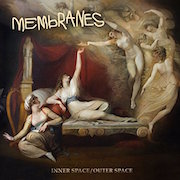In his book on manners and morals, The Unexpurgated Code, JP Donleavy offers the following advice when faced with an uppity barber:
“How do you want it styled sir.”
“I should like it styled to look as if I did not just have a haircut given me by some inept bastard just cashiered from Barber College.”
“Hey what an attitude. Would sir then like the most recent style.”
“An old style will do.”
“I see, well if that’s how sir wants it.”
“That’s exactly how sir wants it.”
It may seem strange to start this review with that particular exchange, but it was the first thing that came to mind on hearing of this album’s release. “An old style will do.” You see, for me, remix albums are often a bore; they seem to lose the focus, or the “linearity” of the original – the qualities that probably attracted the listener in the first place. And then there’s that annoying thing of the remix artists always wanting to pick the same, limited number of tracks. Why the fug is that? Added to all of that miserable stuff, last year’s Membranes’ Dark Matter / Dark Energy was one of my favourite records of this decade: brimful of energy, wit and intelligence. I didn’t initially see the need to tamper with a brilliant original.
But this record, Inner Space / Outer Space, is a belter. It is the product of even more “stick it to ‘em” determination and ambition as that which drove Dark Matter / Dark Energy. It seems that the Membranes know they have made something special and want to wring every last drop of potential from their work. Dark Matter… has benefitted from having its vanity tickled by choirs in the Baltic, and given its due by learned professors wheeled out onstage to explain dark matter. Why not collate a new interpretation of the material?
John Robb must have called on every favour standing to pull this record together, and most of the artists contributing to it need no introduction. What’s really great about all of this, though, is the fact that it doesn’t feel like an old mates job: for every post-punk comrade (Youth, Mark Stewart, Keith Levene) there are surprises. Composer du jour, Clint Mansell (from the criminally underrated – in my books anyway – Pop Will Eat Itself) is one. His take on ‘Universe Explodes’ is a haunting, reflective score that could easily grace one of those luxurious television murder mysteries. The brilliant Barfak from Tehran (who reassembled my own dark matter with their gig at Tallinn Music Week in March) is another, and proof of Robb’s restless musical tastes. Cats, you all need to get down with Barfak. They shepherd the itchy ‘Magic Eye (To See the Sky)’ into a new setting; one that seems totally unrecognisable at times. Ghostly robotic voices, vocoded to the max, usher in one of the most nonlinear tracks imaginable. Here, ‘Magic Eye…’ is shaken out into a shape-shifting collection of thoughts and attitudes; stuffed full of the weirdest mix of groovy, trippy Rubble-style soundscapes and a rootless, C21st Iranian prog. It’s impossible to get a grip on.
Of course the big names will initially attract. Manic Street Preachers, Mark Lanegan, Alexander Hacke, Godflesh, Therapy?, Carter Tutti. That is some list. But, given the quality of their work on here, it’s right we highlight them. The Manics’ take on ‘Universe Explodes’, for instance, is a typically high-octane clarion call with mercurial approaches to harmonies and melodic flourishes aplenty. It could not be more different to Mansell’s. Lanegan’s powerful, doomy piece is a droning testament to his own particular Hades. And Alexander Hacke’s track, ‘The Hum of The Universe’ is a worthy end to the record, coming on like The Julie Mittens playing along to a cock-rock video. We get plenty of that Neubauten-esque exercise of deliberately contrasting loud against quiet, and harsh against soft. The sharp metallic clang of guitars and humming vocals create a soundscape that could (again) be employed in some blockbuster TV production.
Maybe the true greatness of this album is that the music is, rather like the T34 tank of yore, readily and easily reassembled, and pressed back into service. Membranes tracks have a real sturdiness and adaptability about them, and it’s this adaptability of the originals that has helped the contributing artists realise their own goals and reaffirm their own personalities, bringing a gusto and real sense of enjoyment to the whole record. Listen to the sonic warfare created by Godflesh, or the needle-sharp, but otherworldly reinterpretation of ‘Dark Matter’ by Keith Levene. Or Die Fledermaus coming over all Momus on us with the reworking of ‘The Breathing Song’. Or Carter Tutti’s strange, throbbing, dub rework of ‘In The Graveyard’, which seems to have escaped from a Bronze Age burial mound. To cap it all, listen to the way Mark Lanegan sings “All I can see, is dark energy.” He loves it. Regardless of whether Lanegan and Robb see, or want to project dark energy as the same thing, the track can cut loose in a new way.
There’s not a bad track on this record. And it works. It’s quite brilliant in fact. In fact, I feel pretty bad about not discussing every track in detail, as somehow they all deserve it. One can only guess at what Membranes will do next, but right now they are in a very special place, creatively, and deserve your full attention.


